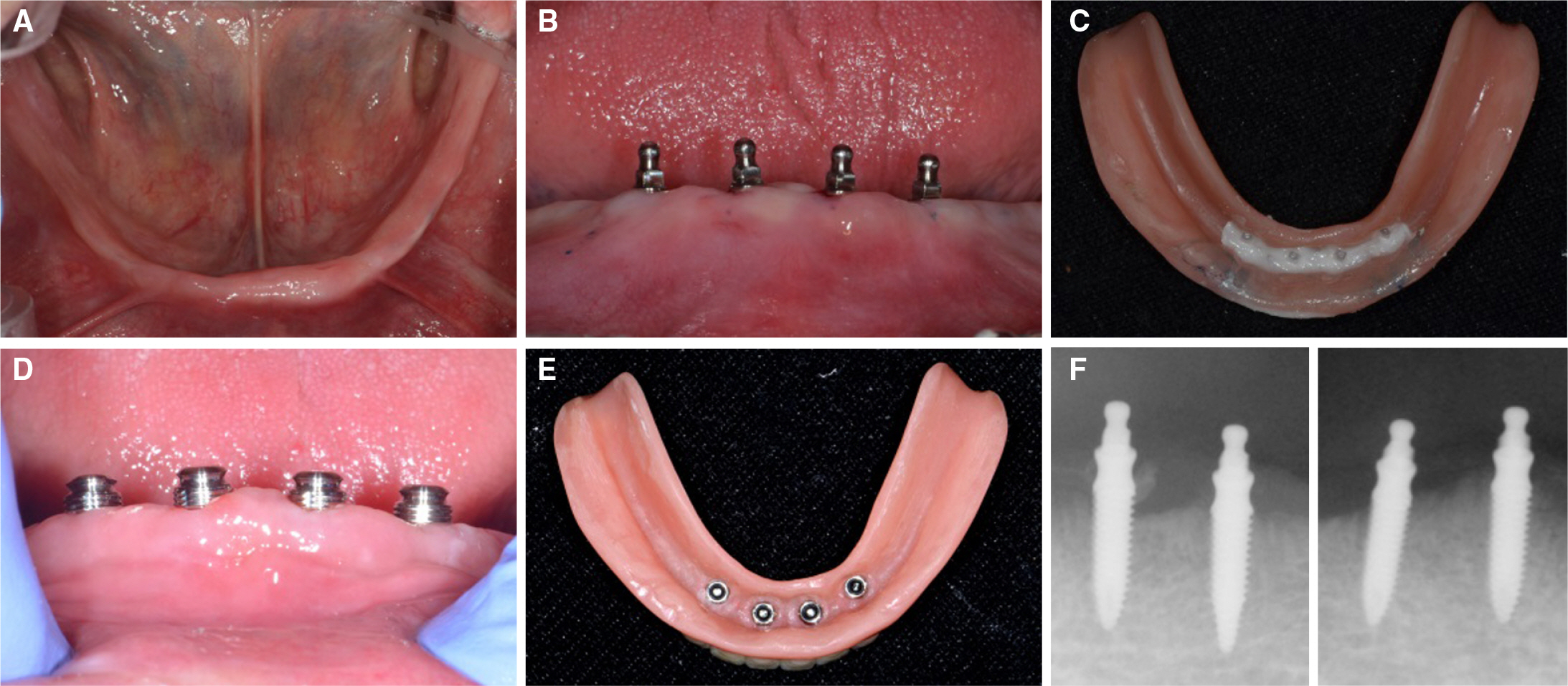J Korean Acad Prosthodont.
2016 Jul;54(3):267-272. 10.4047/jkap.2016.54.3.267.
Mandibular implant supported overdentures with two different mini-implant systems: A case report
- Affiliations
-
- 1Department of Prosthodontics, Institute for Clinical Dental Research, Korea University Medical Center, Korea University, Seoul, Republic of Korea. swshin@korea.ac.kr
- 2Division of Prosthodontics, Department of Dentistry, Anam Hospital, Korea University, Seoul, Republic of Korea.
- KMID: 2344866
- DOI: http://doi.org/10.4047/jkap.2016.54.3.267
Abstract
- This case report describes the treatment of two fully edentulous patients with mini-implant overdentures using different implant systems on narrow mandibular alveolar bone ridge. They were complaining about discomfort and pain wearing mandibular conventional complete dentures caused by insufficient retention. Each patient received four mini-implants in the interforaminal area of the mandible using the non-submerged flapless surgical approach. One-body type implant (Slimline, Dentium, Seoul, Korea) was used for a patient and loaded immediately after surgery. Metal housings of O-ring were attached by direct technique. For the other patient, two-piece type implant (LODI, Zest Anchors, Escondido, CA, USA) was used and impressions were made for attachment connection of the Locator's metal housings after 8 weeks of surgery. Within this case report, mandibular mini-implant overdentures using different implant systems showed improvement of patient satisfaction with favorable peri-implant tissue response 6 months after attachment connection. However, long-term follow-up is needed for further evaluation.
Keyword
MeSH Terms
Figure
Reference
-
1.Bidra AS., Almas K. Mini implants for definitive prosthodontic treatment: a systematic review. J Prosthet Dent. 2013. 109:156–64.
Article2.Shatkin TE., Petrotto CA. Mini dental implants: a retrospective analysis of 5640 implants placed over a 12-year period. Compend Contin Educ Dent. 2012. 33:2–9.3.Jofré J., Conrady Y., Carrasco C. Survival of splinted mini-implants after contamination with stainless steel. Int J Oral Maxillofac Implants. 2010. 25:351–6.4.Morneburg TR., Pröschel PA. Success rates of microimplants in edentulous patients with residual ridge resorption. Int J Oral Maxillofac Implants. 2008. 23:270–6.5.Elsyad MA., Gebreel AA., Fouad MM., Elshoukouki AH. The clinical and radiographic outcome of immediately loaded mini implants supporting a mandibular overdenture. A 3-year prospective study. J Oral Rehabil. 2011. 38:827–34.
Article6.Maryod WH., Ali SM., Shawky AF. Immediate versus early loading of mini-implants supporting mandibular overdentures: a preliminary 3-year clinical outcome report. Int J Prosthodont. 2014. 27:553–60.7.Allum SR., Tomlinson RA., Joshi R. The impact of loads on standard diameter, small diameter and mini implants: a comparative laboratory study. Clin Oral Implants Res. 2008. 19:553–9.
Article8.Hasan I., Heinemann F., Aitlahrach M., Bourauel C. Biomechanical finite element analysis of small diameter and short dental implant. Biomed Tech (Berl). 2010. 55:341–50.
Article9.Flanagan D., Mascolo A. The mini dental implant in fixed and removable prosthetics: a review. J Oral Implantol. 2011. 37:123–32.
Article10.Souza RF., Ribeiro AB., Della Vecchia MP., Costa L., Cunha TR., Reis AC., Albuquerque RF Jr. Mini vs. Standard Implants for Mandibular Overdentures: A Randomized Trial. J Dent Res. 2015. 94:1376–84.11.Mundt T., Schwahn C., Stark T., Biffar R. Clinical response of edentulous people treated with mini dental implants in nine dental practices. Gerodontology. 2015. 32:179–87.
Article12.Dilek O., Tezulas E., Dincel M. Required minimum primary stability and torque values for immediate loading of mini dental implants: an experimental study in nonviable bovine femoral bone. Oral Surg Oral Med Oral Pathol Oral Radiol Endod. 2008. 105:e20–7.
Article13.Preoteasa E., Mele canu-Imre M., Preoteasa CT., Marin M., Lerner H. Aspects of oral morphology as decision factors in mini-implant supported overdenture. Rom J Morphol Embryol. 2010. 51:309–14.14.Sadig WM. Special technique for attachment incorporation with an implant overdenture. J Prosthet Dent. 2003. 89:93–6.
Article15.Nissan J., Oz-Ari B., Gross O., Ghelfan O., Chaushu G. Long-term prosthetic aftercare of direct vs. indirect attachment incorporation techniques to mandibular implant-supported overdenture. Clin Oral Implants Res. 2011. 22:627–30.
Article16.Bidra AS., Agar JR., Taylor TD., Lee C., Ortegon S. Techniques for incorporation of attachments in implant-retained overdentures with unsplinted abutments. J Prosthet Dent. 2012. 107:288–99.
Article17.Walton JN., Huizinga SC., Peck CC. Implant angulation: a measurement technique, implant overdenture maintenance, and the influence of surgical experience. Int J Prosthodont. 2001. 14:523–30.
- Full Text Links
- Actions
-
Cited
- CITED
-
- Close
- Share
- Similar articles
-
- Implant Surgery for Fixed Implant-supported Prostheses in the Edentulous Mandible: A Case Report
- Use of polyaryletherketone (PAEK) based polymer for implant-supported telescopic overdenture: A case report
- Open and Closed Mouth Impression Techniques for Mandibular Implant Overdenture: Two Cases Report
- Implant and root supported overdentures - a literature review and some data on bone loss in edentulous jaws
- Mini-implant with additional retentive structure by using digital method





